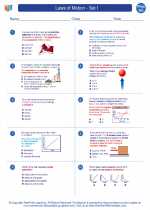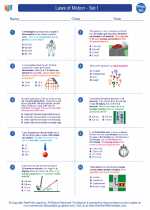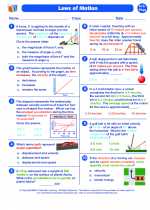Conductivity
Conductivity refers to the ability of a material to conduct electric current. It is an important property in various fields, including physics, chemistry, and engineering.
Factors Affecting Conductivity
- Material: Different materials have different conductivity properties. Metals, for example, are good conductors of electricity, while nonmetals are typically poor conductors.
- Temperature: In general, the conductivity of metals decreases with increasing temperature, while the conductivity of semiconductors and insulators increases with temperature.
- Impurities: The presence of impurities in a material can affect its conductivity. For example, adding impurities to a semiconductor can increase its conductivity in a process known as doping.
Units of Conductivity
Conductivity is typically measured in units of siemens per meter (S/m) in the International System of Units (SI).
Applications of Conductivity
Conductivity has various practical applications, including:
- Electrical wiring and circuitry
- Electronic devices
- Material testing and analysis
- Water quality testing (measuring the conductivity of water to assess its purity)
Study Guide
To understand conductivity better, consider the following study guide:
- Review the basics of electric current and its behavior in different materials.
- Learn about the factors that affect conductivity, such as material type, temperature, and impurities.
- Explore the units of conductivity and how they are used to measure and compare the conductivity of different materials.
- Research real-world applications of conductivity and how it is utilized in various industries and scientific fields.
- Practice solving problems related to conductivity, such as calculating the conductivity of a given material or analyzing the effects of temperature changes on conductivity.
By mastering the concept of conductivity, you will gain insights into the behavior of materials in the presence of electric fields and the practical implications of their conductive properties.
[Conductivity] Related Worksheets and Study Guides:
.◂Physics Worksheets and Study Guides High School. Laws of Motion - Set I
Worksheet/Answer key Laws of Motion - Set I
Laws of Motion - Set I  Worksheet/Answer key
Worksheet/Answer key Laws of Motion - Set I
Laws of Motion - Set I  Worksheet/Answer key
Worksheet/Answer key Laws of Motion - Set I
Laws of Motion - Set I  Worksheet/Answer key
Worksheet/Answer key Laws of Motion - Set I
Laws of Motion - Set I 

 Worksheet/Answer key
Worksheet/Answer key
 Worksheet/Answer key
Worksheet/Answer key
 Worksheet/Answer key
Worksheet/Answer key

The resources above cover the following skills:
PHYSICAL SCIENCE (NGSS)
Energy
Students who demonstrate understanding can:
Develop and use models to illustrate that energy at the macroscopic scale can be accounted for as either motions of particles or energy stored in fields.